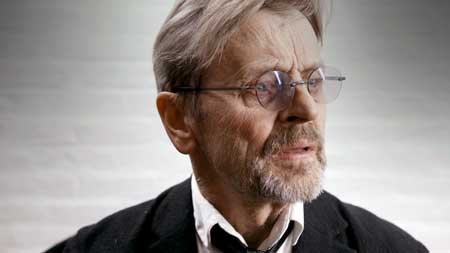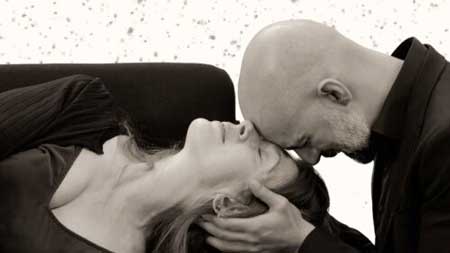Play (2022)
Based on The Cherry Orchard (1903)
by Anton Chekhov
As translated by Carol Rocamora
Directed by Igor Golyak
Emerson Paramount Theater
Theater District, Washington Street, Boston
November 4-13, 2022
Also available streaming online!
Scenic Design: Anna Fedorova; Lighting Design: Yuki Makase Link; Costume Design: Dana Botez; Projections Design: Alex Basco Koch; Sound Design: Tei Blow; Music Composition: Jakov Jakoulov: Robotics Design: Tom Sepe; Video Design: Eric Dunlap
With Jessica Hecht (Lyubov Andrevna Ranevskaya), Mikhail Baryshnikov (Firs Nikolaevich), Nael Nacer (Yermolai Alekseevich Lopakhin), Juliet Brett (Anya), Seth Gore (Pyotr Sergeevich Trofimov), Jeffrey Hayenga (Leonid Andreevich Gaev), Elise Kibler (Varya Mikahilovna),Gene Ravvin (Passerby)

in “The Orchard”
Photo: Courtesy of Arlekin Players Theatre
The estate held by Lyubov Andreevna Ranevskaya (Jessica Hecht), home to the eponymous cherry orchard, is up for sale. Yermolai Alekseevich Lopakhin (Nael Nacer) is deeply involved in the sale of the orchard and appears, as well, to be a potential suitor to Varya Mikhailovna (Elise Kibler) though there seems to be more electricity between him and Ranevskaya. The rest of the family, and notably the old servant Firs Nikolaevich (Mikhail Baryshnikov), hover around offering various degrees of support for transition while strongly conveying a lingering lamentation for a lost age.
Over the past several years, the Arlekin Players Theatre under Igor Golyak has made its way, steadily, into a prominent place in the Boston theatre scene. Its productions tend to be daring and somewhat offbeat. They don’t always work, but they are courageously conceived and have an intensity and directness that reflect serious artistic intentions.
The current production is definitely in keeping with this offbeat and daring aspect of Arlekin productions and in this case it really works. The core of the play is Chekhov’s classic, but there is enough adaptation in staging to make one re-conceptualize the whole play in different terms.
Traditionally, The Cherry Orchard is a languorous tragicomedy. Chekhov frequently chose to see his own works, regardless of their tragic interiors, as encased in a comic frame. That frame is not hilarity but a wry perspective that casts doubt on the nature of the entire context in which the play operates. In most of his plays, that context is the despairing and aimless indirection of the landed gentry in late nineteenth century Russia. Though the characters within the plays often experience personal tragedies, the comic frame makes one take the tragedies with a shake of comedic salt, helping to point to the massive class imbalances surrounding them. Overtones of the lamentable condition of those who had not long before been serfs is never too far away from depictions of these tragic interactions of the gentry.
Here, Golyak has the Arlekins do a doubletake on that frame and the result is fascinating. Yes, indeed, the play is about the loss of a family’s estate, but, in this production it becomes so much more. It’s as though, given the events of the last year involving Russia’s invasion of Ukraine that the play suggests quite strongly that something great in the soul of Russia has been lost or sold off. Though never made explicit, that theme would appear to be at the heart of this production; the implications of that interpretation come through eerily and penetratingly.
At the start, two things immediately give one pause: the screen that sits at the front of the stage upon which all sorts of visual displays appear throughout the production, and a large robotic gizmo which stands in the center of the stage, seemingly eerily out of place, terribly modern, and omnipresent. It turns out that this huge gizmo forms a kind of essential focus throughout the show and one gradually catches on that this robot which bends and tilts in all kinds of directions is meant to be a kind of central metaphor for the new frame of this Russian classic.

Nael Nacer as Lopakhin
in “The Orchard”
Photo: Courtesy of Arlekin Players Theatre
As one looks at this thing at the outset one just wonders what the hell it is and what it’s doing there. Gradually, it seems as though it is a modern analogue for a tree, an emblem of the orchard. But then, why so modern and robotic? And then it dawns on one that this has something to do with the terrors of modernism encroaching upon the dramatic world of the nineteenth century depicted in the play, but also upon all of us in the contemporary world. It seemed then that it might well represent a bomb, a nuclear one, or perhaps, a tool of invasive surveillance. Whatever it represents – and it may not represent anything specific at all – it looms and lurks and wanders and invades one’s sense of the space in which these characters live, and, by analogy, the space in which we all live.
So, in a way, this robotic emblem then becomes a signal for what feels like the embracing subtext – which in part is a lament for a Russia come and gone, but also a lament for a world which is once again increasingly threatened by fascism, by the looming of mechanistic powers which are all too ready to surveil us and which threaten the ordinary lives we lead.
The various projections on the scrim in front help to embellish these ideas, as well as providing some very lush, 3-D, images of cherry blossoms in a storm of release. All of that is also very effective. And, in some bizarre way, even though the scrim feels like a barrier between the audience and the action on stage, that feels appropriate too. We look, as though through a glass darkly, at the events of the past and view them as a kind of curio, with sentiment and wonder, and some distance.
The casting of this show is magnificent. In the oddly central role of Firs, the old servant, in this production, Mikhail Baryshnikov of ballet fame, prevails. He is an excellent actor and brings a special dignity and gravitas to this role which, in other productions, takes a back seat to the other goings on. Here, the role is emblematic of the subtext – the lost innocence of the old world, captured in Baryshnikov’s lilting, resonant voice and shuffling gait – and in many ways represents the moral and emotional anchor of the entire production.
In the role of Ranevskaya, the elegant matron of the estate, Jesse Hecht brings a wonderful grace and charm, which makes her appeal to the rich and imposing Lopakhin all the more believable. In the role of Lopakhin, Nael Nacer, one of Boston’s leading and most persuasive actors, is hauntingly brilliant. He makes his quite unappealingly written role seem appealing and manages to be persuasive if not, quite appropriately, entirely charming.
The other members of the cast are also very good, filling out the drama eminently well. When, for example, Varya (Elise Kibler) has to go through the variations of responses to Lopakhin’s seemingly imminent proposal of marriage, she is wonderfully varied and responsive, her face changing rapidly with her marital fortunes. Much of this feeling prevails among the other characters as well. As Leonid Andreevich Gaev, Jeffrey Hayenga delivers a magisterial but appealing demeanor, a bit different from the traditional portrayal as an irresponsibly errant aristocrat, and a bit more coherent with the same kind of charms Hecht radiates in the role of his sister Ranevskaya.
Russian and French, frequently untranslated, abound in this production, making it wonderfully opaque in some places, accentuating that our linguistic boundaries and differences of culture do indeed keep us at arm’s length from one another. At one point, Nacer, a native French speaker, gives a quite long speech in French, totally untranslated; that and some untranslated Russian speeches create a Babel-like brilliance and somehow, though inaccessible, it works.
There are great moments of humor in this production. One of them involves a scene in which all members of the cast do improvisational jigs – all except for the great dancer in the cast, Baryshnikov. It is a hilarious omission and fabulously penetrating in its irony.
This is, like almost all Arlekin productions, a bit off the wall, demanding a fair amount from its audience. But, in this case, the elements fuse in such a way to be particularly powerful and persuasive. One comes away transfixed by the visual storms of cherry blossoms, by the looming robot, by Baryshnikov’s penetrating and evocative voice, and by Nacer’s and Hecht’s magisterial evocation of those prominent roles on opposite sides of the social equation.
This production gives a totally new twist on the classic play and reshapes its significance for the contemporary world, while also allowing its innate poetry, as embodied by its talented cast, to emerge as well. Offbeat, highly satisfying, well worth seeing.
– BADMan (aka Charles Munitz)
Leave a Reply